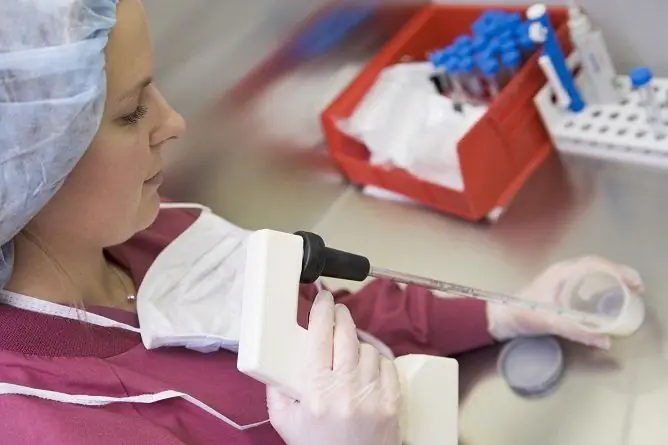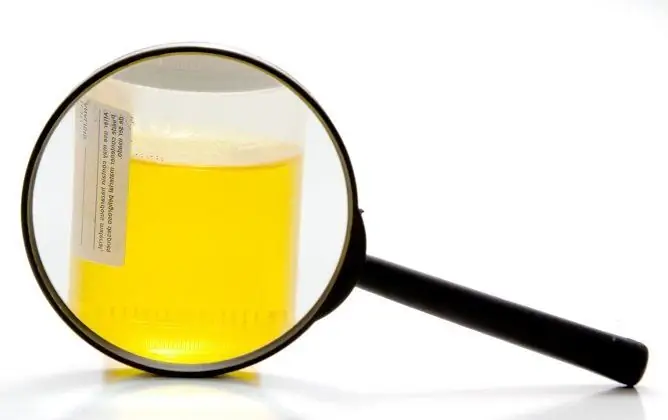- Author Rachel Wainwright wainwright@abchealthonline.com.
- Public 2023-12-15 07:39.
- Last modified 2025-11-02 20:14.
Tests for adrenal hormones: indications, preparation for delivery, the norm and deviations from it
The content of the article:
-
Indications
- Total cortisol
- Aldosterone
- Dihydroepiandrosterone
- How to get tested correctly
- Norm and deviations from it
- Urinalysis for adrenal hormones
- Adrenal hormones: their names and functions
- Video
Doctors often prescribe tests for adrenal hormones to their patients. This is due to the fact that these hormones play an important role in the regulation of many functions of the human body, increase its resistance to stress and disease.

Adrenal hormones play an important role in metabolic processes, analyzes allow you to establish a deviation of their content from the norm
Indications
The doctor may prescribe a blood test for adrenal hormones to the patient to exclude or confirm the diagnosis of a number of diseases of the endocrine system, the symptoms of which may be:
- muscle weakness;
- chronic fatigue syndrome;
- arterial hypertension or hypotension;
- heart rhythm disturbances;
- increased irritability, anxiety;
- depressive conditions;
- nausea, vomiting;
- diarrhea;
- weight loss;
- the appearance of dark spots on open areas of the skin;
- intense thirst;
- cravings for salty foods;
- increased diuresis, combined with signs of dehydration.
Most often, doctors prescribe a determination of the level of cortisol, aldosterone and dehydroepiandrosterone sulfate in the blood. Let's consider the indications for a blood test for each of these hormones in more detail.
Total cortisol
Takes an active part in the development of protective reactions to stress and hunger, regulates a number of metabolic processes. The definition of this indicator is shown in the following cases:
- Itsenko-Cushing's disease;
- Addison's disease;
- osteoporosis;
- hyperpigmentation of the skin;
- violations of menstrual function;
- early sexual development;
- chronic muscle weakness;
- hirsutism.
Aldosterone
Aldosterone regulates potassium and sodium levels in the blood. Indications for laboratory research are:
- arterial hypertension;
- suspicion of adrenal insufficiency;
- orthostatic hypotension;
- suspicion of adrenal adenoma or adrenal hyperplasia;
- primary hyperaldosteronism.
Dihydroepiandrosterone
It is necessary for the correct synthesis of sex hormones (estrogens, progesterone). Its definition is shown in the following situations:
- delayed sexual development;
- androgenital syndrome;
- habitual miscarriage;
- fetal malnutrition;
- insufficiency of the fetoplacental system;
- adrenal tumors.
How to get tested correctly
A blood test for adrenal hormones is an effective laboratory diagnostic method that allows you to identify various hormonal disorders in the human body. However, in order for the obtained result to be reliable and informative, the patient must be properly prepared for the study. It will differ depending on which hormone is being tested.
Preparation for the analysis for dihydroepiandrosterone includes:
- avoidance of stressful situations and physical overstrain within 72 hours before the study;
- significant limitation of the number of cigarettes smoked or complete cessation of smoking;
- the last meal no later than 7-8 hours before blood donation, so it is recommended to take the test in the morning;
- refusal to take certain medications (corticosteroids, estrogens, oral contraceptives).
If it is necessary to check the content of total cortisol, then the day before the study, the patient should:
- stop taking oral contraceptives, estrogens and opiates;
- limit physical activity;
- quit smoking.
Preparation for testing for aldosterone includes:
- following a low-carbohydrate diet for 14 days before the study;
- decrease in the intensity of physical activity;
- avoidance of stressful situations;
- refusal to take antihypertensive and diuretic drugs, steroids, oral contraceptives.
Norm and deviations from it
Only a doctor should decipher the blood test for the level of hormones, taking into account the peculiarities of the clinical picture and data from other laboratory and instrumental studies. However, knowing the indicators of normal values, the patient can draw some conclusions on his own. The following table will help him in this:
| Hormone | Norm | Reasons for the increase | Reasons for downgrading |
| Aldosterone | In the vertical position - 58-172 pg / ml, in the horizontal position - 29-65 pg / ml |
Adrenal hyperplasia, insufficient sodium in the diet, adrenal tumors, increased sweating, significant physical fatigue, edema due to cirrhosis of the liver, heart or kidney failure. During pregnancy, there is an increase in the level of aldosterone, which is not a pathology |
Addison's disease, lack of potassium in the diet, hypofunction of the adrenal glands, embolism or thrombosis of the adrenal vein, drinking a lot of fluids |
| Total cortisol | 230-750 nmol / l |
Itsenko-Cushing's disease, malignant and benign adrenal tumors. During pregnancy, the level of cortisol rises 2-5 times, which is due to a number of physiological reasons |
Addison's disease, chronic adrenal insufficiency |
| Dehydroepisterone sulfate | In women of childbearing age 98.8-340 mcg / dl, in men 160-449 mcg / dl | Tumors of the adrenal glands, adrenogenital syndrome | Threat of spontaneous abortion |
Urinalysis for adrenal hormones
To assess the function of the adrenal glands, a method for determining the content of 17-ketosteroids in daily urine was previously used, which include:
- cortisone;
- 11-deoxycortisol;
- cortisol.
Currently, this method of laboratory diagnostics is practically not used due to its low informative value. Instead, doctors usually prescribe their patients to measure the level of dehydroepiandrosterone in the blood.
Adrenal hormones: their names and functions
The adrenal glands are small endocrine glands located above the upper poles of the kidneys.

The adrenal glands are small, but very important organs for the body
Violation of their secretory function can be manifested by the following symptoms:
- decreased immunity;
- emotional lability;
- insomnia;
- chronic fatigue;
- low resistance to stress;
- depression;
- violation of menstrual function in women;
- decreased sex drive in men;
- oncological and cardiovascular diseases;
- diabetes;
- obesity.
The adrenal glands are made up of the medulla and the cortical area (cortex). The medulla produces hormones called catecholamines:
- adrenalin;
- norepinephrine.
Catecholamines increase the strength and heart rate, increase blood pressure, expand the lumen of the bronchi, and increase the concentration of glucose in the blood. Under the influence of stressful situations, the secretion of catecholamines increases sharply.
The cortical substance produces:
- mineralocorticoids (aldosterone, corticosterone, deoxycorticosterone) - increase the release of K + ions and Na + reabsorption in the kidneys;
- glucocorticoids (cortisol, cortisone) - stimulate the formation of glucose from fats and amino acids, suppress the activity of allergic, immune and inflammatory reactions;
- sex hormones - have a significant effect on the development of secondary sexual characteristics (with their lack, virilization develops, that is, a person has secondary sexual characteristics of the opposite sex).
Video
We offer for viewing a video on the topic of the article.

Elena Minkina Doctor anesthesiologist-resuscitator About the author
Education: graduated from the Tashkent State Medical Institute, specializing in general medicine in 1991. Repeatedly passed refresher courses.
Work experience: anesthesiologist-resuscitator of the city maternity complex, resuscitator of the hemodialysis department.
Found a mistake in the text? Select it and press Ctrl + Enter.






